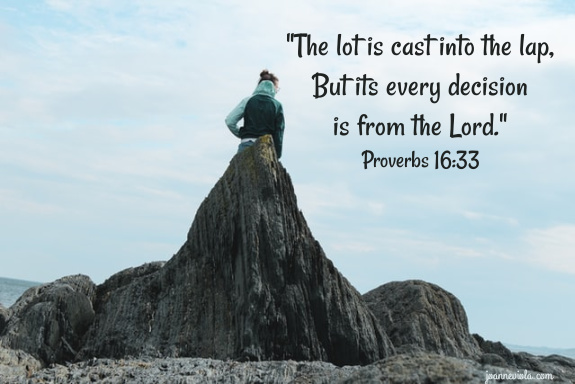The book of Esther is not only bringing new insights, but it is also relevant to current events and brings much hope.
In Esther 3:7-11, we find Haman still at work, working his evil plan that is.
The astrologers cast lots. Not a godly way to make a decision but none the less, their decision gave Esther and Mordecai time to think about what they could do to save the Jews.
Again we see King Ahasuerus’ lack of wisdom. He does not ask any questions of Haman. He simply gives Haman a signet ring (authority) and accepts what has been told to him.
This made me think about the days in which we are living. News and reports can come from many sources. We need to be so careful to do research for ourselves and sort out truth and deception. We are not to swallow everything hook, line, and sinker.
How do you make decisions?
Whether or not we agree with decisions being made in our country, and our communities, we must be praying for our leaders. And we must continue to trust God, who remains sovereign over it all.
“The lot is cast into the lap, But its every decision is from the Lord.”
(Proverbs 16:33, NASB)
May we remember … God has the final say.
~*~*~
In Esther 4:1-5. we find Mordecai’s response to the decree —> deep grief. He not only was wearing clothes which displayed his sorrow and mourning, he “cried out with a loud and bitter cry” (verse 1).
Esther was sheltered in the palace and perhaps this was the only way Mordecai could make her aware of what was occurring. But we don’t know for sure.
We do know Mordecai’s actions caught the attention of her maidens and eunuchs, who came and told her what was occurring.
She too was grieved and sent him clothing to put on, which he refused. Her gesture displays love and compassion for this man who had raised her.
While these events would have no bearing on Esther, as her heritage is still not known to everyone, her gesture is indicative she still cared for her people.
With all that is unfolding in our world, we are called to compassion, and to action.
The study asks: How do you respond to sorrow and grief?
More and more we are going to be compelled to show compassion to those around us.
As I was reading this morning, the words to a song came to mind:
“Bring Your love to life inside of me.
Why don’t You break my heart ’til it moves my hands and feet.
For the hopeless and the broken,
For the ones that don’t know that You love them.
Bring Your love to life inside of me.”(Love Come to Life, Big Daddy Weave)
Praying for His love to come to life in each of us in the most compassionate and powerful of ways!
~*~*~
Esther 4:12-17 lets us in on a conversation which Esther and Mordecai have through a third party.
Back and forth through the messenger, Hathach. How important it was for Hathach to not only get each message correctly, but to also convey the emotion and urgency of what was being said.
The responsibility placed on Hathach was great:
“Hathach certainly had a great responsibility placed on him as the living link between two distressed people who held in their hands the salvation of the Jewish nation.”
(Wiersbe Study Bible, page 688)
Esther’s identity is now revealed and she recognizes it may cost her life, as well as the lives of all her people. Her reply is to pray and fast for three days before she goes into the presence of the king.
Sometimes praying and fasting is the most powerful thing we can do. May we be faithful to pray, and pray, and pray some more.
“Every great movement of God can be traced to a kneeling figure.”
(D.L. Moody)
May we be that kneeling figure!
~*~*~
God has the final say in every world event,
but as His people we are called to be compassionate,
and take our part in building His Kingdom.




I love the DL Moody quote you shared. My heart aches for what’s happening in the world today. So many sources create a weary spirit, so I need to be selective in what I listen to. I love when you said, “May we remember … God has the final say.” This is so true. God is on the throne no matter what is happening.
Joanne, thank you for these reminders. There’s a lot going on and it weighs on all of us. Thank you for helping us remember to focus on the fact that the God has the final say. Even when we don’t know what’s next, we do know the victory at the end!
I’ve loved diving deep into Esther’s story! Prayer is powerful! My prayer too, is for God to lead me during this divisive time to not create more division. My opinions are different from even some of my friends, yet may they not divide us especially as followers of Jesus.
Oh, Joanne … Proverbs 16:33 is such a comfort in these confusing and chaotic times. Another verse I read this week is also helping me keep things in perspective … it’s Proverbs 21:1: “ A king’s heart is like streams of water in the Lord’s hand: He directs it wherever He chooses.†Thank you for this reminder that, as helpless as we may feel right now, there are things we can do that will make a difference.